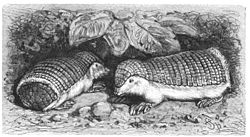Armadillo
A armadillo is in the Cingulata, an order of New World placental mammals. The living ones have a leathery armored shell. The word armadillo is Spanish for "little armored one".
| Armadillos Temporal range: Palaeocene–Recent
| |
|---|---|

| |
| Nine-banded Armadillo | |
| Scientific classification | |
| Kingdom: | |
| Phylum: | |
| Class: | |
| Superorder: | |
| Order: | Cingulata
|
| Families | |
| |

There are about 10 living genera and about 20 species of armadillo. Their average length is about 75 centimeters (30 in), including the tail. The giant armadillo grows up to 100 cm (39 in) and weigh 30 kg (66lbs). All species live in the Americas. Most of the 20 species are found in open areas, such as grasslands, but some also live in forests.[1]
Armadillos species are mostly found in South and Central America, especially around Paraguay. Many species are endangered.[2]
Embryology
changeThe nine-banded armadillo has an unusual reproductive system, in which genetically identical quadruplets are born in each litter.[3][4][5]
Because they are always genetically identical clones, the group of four young is a good subject for scientific, behavioural or medical tests. They provide the same biological and genetic makeup, and then get different treatment. This is the only regular case of 'polyembryony' in the class Mammalia, where one fertilised egg splits into four embryos. It only happens in the genus Dasypus, and not in all armadillos. Other animals which have this reproductive method are parasitoid wasps, certain flatworms and various aquatic invertebrates.[4]
Classification
changeOrder CINGULATA
- †Family Pampatheriidae: giant armadillos
- †Family Glyptodontidae: glyptodonts
- Family Dasypodidae: armadillos
- Subfamily Dasypodinae
- Subfamily Tolypeutinae
† indicates extinct taxon
References
change- ↑ "armadillo (mammal) : Introduction -- Britannica Online Encyclopedia". Retrieved 2012-06-08.
- ↑ "Giant Armadillo: Natural History Notebooks". Retrieved 2012-06-08.
- ↑ "The Nine-banded Armadillo (Dasypus novemcinctus)". Edis.ifas.ufl.edu. Retrieved 2009-12-17.
- ↑ 4.0 4.1 Loughry, W.J; Prodohl, Paulo A; McDonough, Colleen M; & Avise, John C (May–June 1998), "Polyembryony in Armadillos" (PDF), American Scientist, 86 (3): 274–279, Bibcode:1998AmSci..86..274L, doi:10.1511/1998.3.274, S2CID 196608283, archived from the original (PDF) on 2012-02-13, retrieved 2012-02-21
{{citation}}: CS1 maint: multiple names: authors list (link) - ↑ Hamlett, G.W.D (September 1933), "Polyembryony in the Armadillo: genetic or physiological?", The Quarterly Review of Biology, 8 (3): 348–358, doi:10.1086/394444, JSTOR 2808431, S2CID 86435985